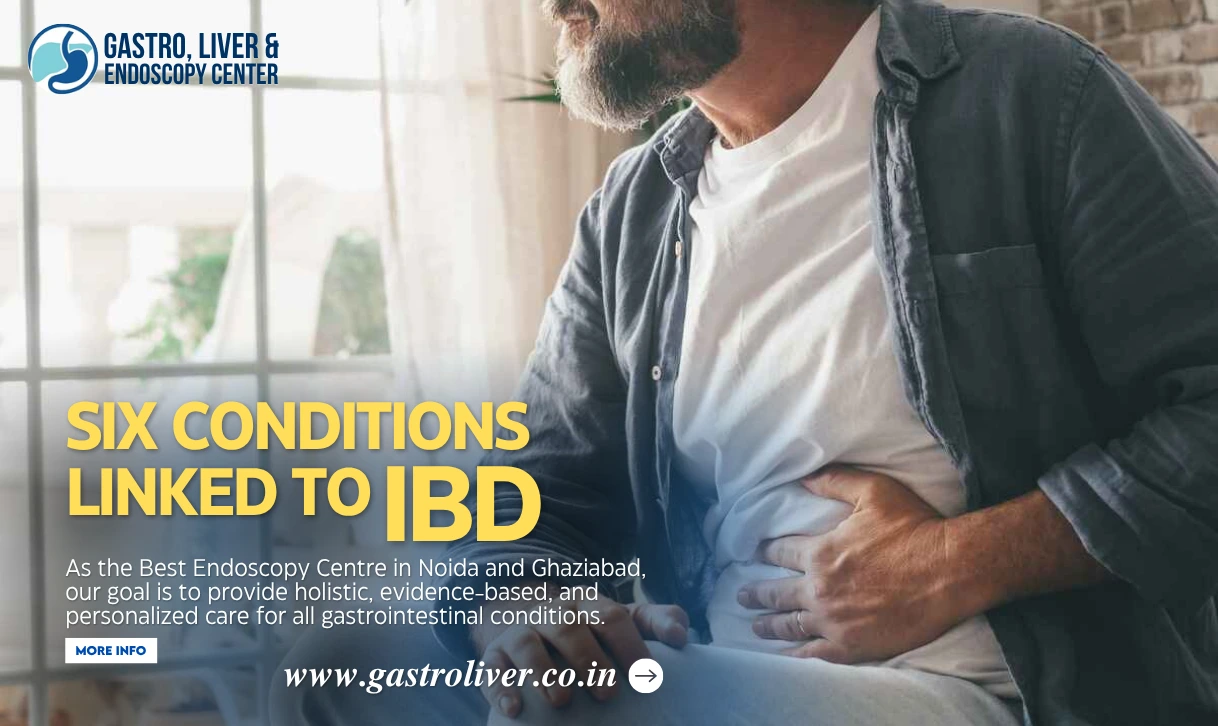6 Conditions Linked to IBD | Dr. Manish Kumar Gupta
Inflammatory Bowel Disease (IBD) is a chronic condition that affects millions of people worldwide, and India is no exception. IBD primarily includes Crohn’s Disease and Ulcerative Colitis, both of which involve chronic inflammation of the gastrointestinal (GI) tract. While these are the core conditions classified under IBD, several other health issues are commonly associated with it — either as complications, co-existing diseases, or consequences of ongoing inflammation and treatment.
At Gastro, Liver & Endoscopy Center, under the expert care of Dr. Manish Kumar Gupta, one of the Top Gastroenterologists in Noida and Ghaziabad, we aim to educate patients on the wider spectrum of diseases linked to IBD. As the Best Endoscopy Centre in Noida and Ghaziabad, our goal is to provide holistic, evidence-based, and personalized care for all gastrointestinal conditions.
Let’s explore six conditions that are frequently linked to IBD:
1. Primary Sclerosing Cholangitis (PSC):
PSC is a chronic liver disease that involves inflammation and scarring of the bile ducts. It is more commonly associated with Ulcerative Colitis, although it can also occur in Crohn’s Disease. Over time, PSC can lead to liver failure and an increased risk of bile duct cancer.
Symptoms:
- Fatigue
- Itching
- Jaundice
- Abdominal pain
Early diagnosis is crucial. At Gastro, Liver & Endoscopy Center, we offer advanced liver function testing and MRCP (Magnetic Resonance Cholangiopancreatography) to monitor liver health in IBD patients.
2. Arthritis and Joint Pain:
Approximately 30% of IBD patients experience joint-related problems, including peripheral arthritis (affecting arms and legs) and axial arthritis (affecting the spine and pelvis). These joint issues often flare up when IBD is active.
Symptoms:
- Joint stiffness (especially in the morning)
- Swelling
- Reduced mobility
- Chronic pain
As one of the Best Gastro Doctors in Noida, Dr. Manish Kumar Gupta collaborates with rheumatologists to manage joint-related complications effectively.
3. Skin Disorders:
IBD can affect your skin in several ways. Some of the most common skin conditions linked to IBD include:
- Erythema Nodosum: Painful red nodules, usually on the legs
- Pyoderma Gangrenosum: Deep ulcers that are hard to heal
- Psoriasis: Chronic inflammatory skin condition that may flare with IBD
At Gastro, Liver & Endoscopy Center, we work with dermatologists to treat these skin issues comprehensively.
4. Eye Complications:
Eye issues such as Uveitis, Episcleritis, and Keratitis are often found in IBD patients. These conditions can range from mild irritation to serious vision-threatening inflammation.
Symptoms:
- Redness
- Pain
- Blurry vision
- Sensitivity to light
Early eye screening and prompt referral are essential. If you are dealing with persistent eye discomfort and are diagnosed with IBD, don’t delay in consulting the Top Gastroenterologist in Ghaziabad, Dr. Manish Kumar Gupta.
5. Osteoporosis:
Chronic inflammation, poor nutrient absorption, and prolonged use of corticosteroids can lead to weakened bones or osteoporosis in IBD patients. This makes them more prone to fractures and bone pain.
Risk Factors:
- Vitamin D and calcium deficiency
- Long-term steroid use
- Malabsorption
Bone density scans and lifestyle counseling at our center help prevent this silent but serious condition.
6. Mental Health Issues (Anxiety and Depression):
Living with a chronic illness like IBD can take a toll on a patient’s mental health. Studies suggest that anxiety and depression are more common in people with IBD than in the general population.
Contributing Factors:
- Fear of flare-ups
- Social embarrassment
- Medication side effects
- Chronic fatigue
At the Gastro, Liver & Endoscopy Center, we emphasize a mind-gut connection and recommend counseling, stress reduction techniques, and in some cases, psychiatric evaluation.
Comprehensive Care at Gastro, Liver & Endoscopy Center:
IBD is not just a gastrointestinal issue — it is a systemic disease with the potential to affect multiple organs and systems. At our center, we don’t just focus on symptoms; we treat the whole patient. With advanced diagnostic tools, including colonoscopy, endoscopy, capsule endoscopy, and imaging services, we ensure timely diagnosis and personalized treatment plans.
Whether you're experiencing GI discomfort, unexplained fatigue, or extra-intestinal symptoms, consult Dr. Manish Kumar Gupta, the Top Gastroenterologist in Noida and Ghaziabad, and get expert help at the Best Endoscopy Centre in the region.
FAQs:
1. What are the early signs of IBD?
Common early symptoms include abdominal pain, diarrhea (sometimes with blood), weight loss, and fatigue. If persistent, these symptoms should be evaluated by a gastroenterologist.
2. Can IBD be cured permanently?
There is no permanent cure for IBD yet, but it can be effectively managed with medication, lifestyle changes, and regular follow-up care.
3. Is IBD hereditary?
Yes, genetics can play a role. Having a family member with IBD increases your risk, though environmental and immune system factors are also involved.
4. Are skin rashes and joint pain related to IBD?
Yes, both are known extra-intestinal manifestations of IBD and may indicate disease activity even when GI symptoms are minimal.
5. Can I get pregnant if I have IBD?
Yes, many women with IBD have successful pregnancies. It’s important to consult your gastroenterologist and obstetrician to manage the disease during pregnancy.
6. How often should I get a colonoscopy if I have IBD?
For most patients, colonoscopy is recommended every 1-2 years after 8-10 years of IBD diagnosis, especially to screen for colorectal cancer.
7. Why choose Gastro, Liver & Endoscopy Center for IBD treatment?
With state-of-the-art facilities, compassionate care, and the guidance of Dr. Manish Kumar Gupta, the Best Gastroenterologist in Ghaziabad, we offer comprehensive and specialized care for IBD and its related conditions.

